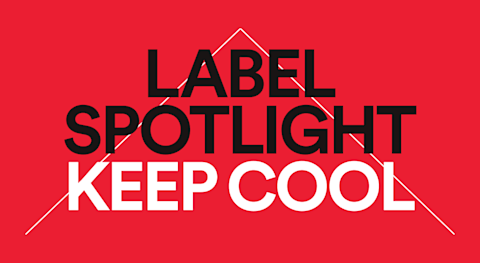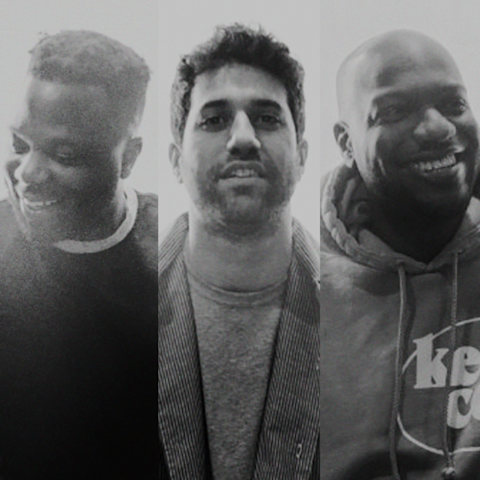The Los Angeles-based label gambles big on new discoveries while remaining focused on the future.
How do you really know that you’re cool? Is it a self-assuredness that comes from within? Is it the validation of your peers? For Keep Cool co-founders Jared Sherman, Tunji Balogun, Courtney Stewart and their team of highly curious and ambitious cohorts, being “cool” is a connection to the love of music, culture, and being wholly yourself, unapologetically.
In 2008, Sherman, Balogun, and Stewart first crossed paths while working in the music industry in the often intertwined worlds of martketing, artist management and A&R. What brought them together as friends was a shared a love of liner notes, similar beliefs about preserving artists' integrity, and a common vision for the future music. “Some of my best music conversations and talks about life and culture were with Tunji and Courtney,” says Jared Sherman, who is also a marketing exec at RCA Records. “The three of us really developed this strong bond and chemistry that was magical and still is to this day.” From those conversations came daydreams, which led to a shared opportunity to capture lightning in a bottle: singer-songwriter Khalid.
(l-r) Keep Cool founders Tunji Balogun, Jared Sherman, and Courtney Stewart
“We formed Keep Cool from all of us working on Khalid’s American Teen in different capacities,” shares Courtney Stewart, who is credited with discovering the El Paso superstar. “Tunji was the A&R who signed TRAPSOUL sensation Bryson Tiller, Jared was joining us from his time as a marketer at The FADER, and I was coming from managing Bobby V [Valentino] to work with Khalid in a similar capacity. That’s how we grew closer as friends because we talked a lot about Khalid and with him having so much great success, it gave us a bond for one and the confidence to say, ‘Hey, we can do this together with other artists.’” By being on the same page and without any L’s on their record, their friendship forged the path that would become Keep Cool.
“There would be no Keep Cool if it wasn’t for three songs: Bryson Tiller’s ‘Don’t,’ H.E.R.’s ‘Best Part,’ and Khalid’s ‘Location,’” says Tunji Balogun, who is also executive vice president of A&R at RCA Records. “There is a dynamic here between myself, Jared, and Courtney. Not only do we come up with great ideas together, we feed off of each other’s energies, but also know how to execute and get the artist to really tap in and believe in what [Keep Cool] is trying to accomplish.
A creative safe haven
With a diverse array of artists like Seattle neo-soul sensation UMI and pop queen-on-the-rise Normani, Keep Cool is uniquely forward-thinking, while harkening back to the past for inspiration. “I’m from Atlanta, born and raised,” says Stewart, whose first client, Bobby V (Valentino), won the BMI Awards’ song of the year in 2005, and gave him insight on how to shift culture while remaining left-of-center. “When LaFace [Records] came [to Atlanta], it really changed the game for me because I saw first-hand [the successes of] OutKast, Goodie Mob, and TLC.” Following that blueprint, Keep Cool is putting the finishing touches on an L.A. office and studio space that serves as a refuge for their artists’ enjoyment and expression. “We are definitely a safe haven for artists,” says Stewart. “There’s no judgment about an artist. It really boils down to the music.” “[Being a safe haven] applies to our approach with the people and the artists that we work with every day, and these different people can go and feel the freedom to share ideas, get inspired and meet others like them in the creative space,” continues Sherman.
Keeping cool — and left of center
“Even the name of the label, ‘Keep Cool,’ [‘cool’] was such a classic music word, going back to the jazz era,” says Tunji Balogun of how this label recalls a nostalgic energy while living on in a new way. In placing creativity and the artist’s vision first, the label is able to separate the standard “business and brand approach” that most labels do, while emboldening artists to create a world that’s so much bigger than themselves. “Our approach with how we set up our artists and the campaigns we run, I’d like to think, are different and unique,” adds Jared Sherman.
And with a roster of diverse talent from R&B sister-duo VanJess to indie rap lords Freddie Gibbs and Madlib, Keep Cool is exactly that because they continue to push forward by using foresight and stand squarely behind the artist. “We’re all true music guys,” says Courtney Stewart. “I look at [Tunji] as one of the most phenomenal guys in the business and I love how we are the behind-the-scenes pioneers that are giving our artists the platform they need to spread their wings to fly and let their voices be heard.”
Taking chances on emerging talent
Being left of center in anything comes with its own challenges. From music snobs who think you’re being too abstract to the casual listeners who “just don’t get it,” Keep Cool has stood out by not settling on the trendy thing at the moment and investing in the development of one-of-a-kind artists. “I think that VanJess, being a duo and [since] groups hadn’t been a thing in over a decade, was an early gamble [for Keep Cool],” shares Stewart. Investing in the Nigerian-American tandem early on, Keep Cool nurtured their artistic growth into an internationally-known force with nearly two million monthly listeners on Spotify, .
Making his debut in his early 30s, celebrated singer-songwriter Lucky Daye, may have been considered “too old” to enjoy the success he's had thus far but Keep Cool’s focus on his talent has helped the New Orleeans-bred singer earn gold plaques, GRAMMY nominations, and recognition as one of the most exciting male R&B vocalists around. “When we signed Lucky, he didn’t have a song out,” says Jared Sherman. “There was nothing to point to in regards to any indicator of success within the market. But we knew what we had and when he came to ‘Keep Cool,’ him and [songwriter and producer] D’Mile had Painted finished and we invested in his videos and content, so that when we were ready to present it to the world, we were more than confident in what we had.”
“No one would have ever thought that Normani would be on the same label as Madlib,” confesses Tunji Balogun. “But there is a throughline that connects them, which is just relentless hard work ethic, talent, and just amazing Black excellence and quality.” Those gambles-turned-treasured-discoveries aid labels such as Keep Cool to influence the game and change the approach to how labels release projects. “There isn’t a morning that I don’t wake up and check the Spotify for Artist app,” adds Balogun. “It’s like checking the weather for the music industry [and] there is no more gratifying email than the one you get when you’re added to a [Spotify] playlist.”
The future
Keep Cool’s latest signees: Marzz, a melodious talent from Louisville, Kentucky and Mills, a soft-spoken songwriter from Bowling Green, Kentucky hint at continued ascendancy for the L.A.-based record label. “I think we’re going to find cool, left of center artists, and keep creating our own lane,” Courtney Stewart shares about the collective’s future. “Mills is our first, pop singer-songwriter that we signed, and I’m super excited for him and for all the artists that are on the label.” Marzz has already captured “artist-to-watch” status with her personal creative statement, “So Frequently,” flooding everyone’s ears since the beginning of 2021.
After bringing R&B back in a major way and showing the Gen-Zers that artists like Madlib are timeless, Keep Cool remains like the other side of a pillow, driven to impact the culture using the tools of the trade available. “I think where technology is heading is going to be interesting,” says Jared Sherman. “We’re going to have to—both on the artist and executive sides—pivot in real time with how we’re releasing and marketing music. Look at how quickly Spotify’s influence and importance has taken over the last few years.”
And with the streets opening back up and a post-COVID world seemingly on the horizon, live tours and being in the studio together are a sight to enjoy. “The next step for [Keep Cool] is us creating an ecosystem for the next generation,” proclaims Tunji Balogun. “A fully-fledged ecosystem for the next generation of artists, creatives, young executives to be able to plug in and tell their stories authentically. [We’re] hoping that we can continue to break artists and show people that we’re about quality and careers. ”
Very cool indeed.

